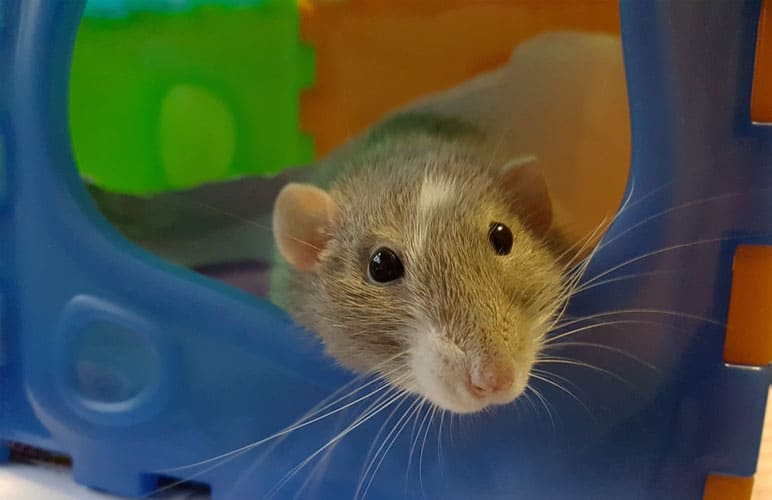Undoubtedly the most accessible rats are those from pet stores. But is getting rats from a pet store the best option?
A pet store can not be the same as a breeder when it comes to obtaining rats. You can’t predict anything about your rat’s past, so it’s a risky venture. In addition, the funds will help these organizations that work to make money from rats rather than improve their lives.
Purchasing a rat from these pet stores is the same thing as purchasing an innocent pup from a dog farm. Pet stores supply these exotic pets from the mill and deliver them to you. Let’s understand more about pet store rats’ health and living conditions.
Is It Okay To Buy Rats From Pet Stores?
Similar to dogs, mass breeders supply rodents and rats to your local pet stores, worsening the issue of overpopulation which leads to animal abandonment and cruelty.
They usually arrive in pet stores sick, starving, or pregnant because they are transported to distributors in tiny, claustrophobic boxes. These boxes basically become incubating areas for pathogens and spread virus and microbial illnesses.
Exotic animals bring in a decent profit for these shops, and their death is nothing but a small loss to them. Rat’s living circumstances at the shops often reflect that.
You can often detect small animals having secretion from the cornea or nostrils, abrasive, spiky tails, matted coats, crouched postures, lethargy, swollen stomachs, and infected, sticky mouths and rectal regions.
Frequent scratching indicates the presence of skin parasites or bacterial infections. Other symptoms of sickness are congestion, panting, low weight, chipped teeth, bleeding or fluid in the excretions, and constipation.
If you buy a rat from your local pet store, you could be getting an ill animal that needs medical attention right away.
They keep failing to provide the proper care for their animals and don’t make the effort to find them loving families. In fact, most of their staff is unaware of a rat’s nutritional needs.
Generally, the rats are bred in facilities that produce large numbers of animals annually without giving any consideration to their safety, lifespan, or health.
Additionally, pet stores do a brilliant job of totally masking rat mills’ operations to the point where the vast majority of the general population is absolutely unaware of them.
How Long Do Store-Bought Rats Usually Live?
The most important factors affecting your beloved rat’s average lifespan are genes, health, and origin.
Rats have an average lifespan of 2 years, but it may vary. There are many other adorable rat facts that you might find interesting in this article here!
Average lifespan cannot be a one-size-fits-all concept; not every shop-bought rat is destined to die soon, and not every exotic rat is bred by a trustworthy breeder.
Pet store rats, often known as “feeder” rats, are available to buy as pets as well as prey for reptilian predators like snakes.
Rats that are obtained from a shop usually have poor genetics, are more prone to diseases and tumors, and aren’t likely to have the same lifespan as exotic rats. Usually, rats purchased from stores survive 12 to 24 months.
Sometimes pet stores may get stocks from nearby exotic rat breeders.
However, with proper medical care, a lively habitat, and a healthy diet, your pet store rat might survive up to 36 months!
Are Rats From PetCo Healthy?
Rats from PetCo, as well as other pet stores, are not healthy. Every rat in a pet store, irrespective of their age, is provided the same meal, which is of poor quality.
However, since they develop so quickly, juvenile rats need a diet that is a little bit different from that of mature rats.

This diet should be rich in animal protein. Lack of this essential protein could cause newborns to grow underweight, underdeveloped, and perhaps malnourished.
The issue is not that these store rats are not provided food, the problem starts when they are not provided a diet according to their growing age. It leads to a lifelong effect on the growth of rats.
To create a healthy pet rat diet, read this article here.
Many newborn pet shop rats are confined in extremely crowded circumstances, and containers have bad air circulation; therefore, many pet shop rodents develop upper respiratory issues early on.
Additionally, these species are often troubled by the approaching people and, sometimes, do not even have a hidden spot whenever they need some personal space.
The continuous existence of visitors or kids knocking on the window and shouting will be stressful for a small rodent.
Stress could weaken the immunological system and make rats more susceptible to diseases, especially in juvenile rats, that are the majority of pet store stock.
On the way to pet shops, these animals go through great suffering and sometimes even die tragically.
Female rats are held within the same container as males and are bred to death again and again without any rest or any interaction with their offspring.
Rats purchased from a local pet store (more precisely from a rat factory) would sell to everyone who has money despite verifying if they could look after them properly and would not need updates after the initial few weeks.
Thus they are not able to maintain a record of the well-being of the animals they are producing and make wise decisions.
Another issue with pet store rats is that they are subjected to several virus infections.
Where Should I Buy A Rat From?
Pet rats can be acquired from a variety of sources, including reputed breeders, rescue groups, and your veterinary doctor.
You are required to bring a tiny carrier with you regardless of where you purchase your rat because they won’t provide it to you.
Most pet stores will give you a little container or carry bag to keep your rat inside, which can scare the animal.
If you get a rat from rescue groups like those in anyratrescue.org, your money will help more pets that are truly in need. Your purchase from a well-known breeder supports that breeder’s ongoing attempts to promote the health and wellbeing of animals.
If you’re hoping to purchase a rat from a reputable breeding facility, then the local breeders are usually your safest choice.
Additionally, a breeder may provide you with a wide variety of breeds and colorations that you might not see at pet shops.
Rats of all ages are usually available for adoption at nearby pet shelters. Sometimes, people get unwanted litter and are unable to find homes for those baby rats.
Mature rats left behind by their caretakers often end up in rescue programs.
A lot of these creatures are probably available for adoption at your nearest humane society as well as the Furry Friends Orphanage foster homes service operated by the Rat and Mouse Club of America (RMCA) has facilities located all over the country.
How Do You Pick A Pet Rat?
There are several factors that contribute to picking up a healthy rat. Once you have made up your mind about getting a rat, you should consider the following points depending on your lifestyle and requirements.
Heath issues
While selecting a young rat, you need to check for sparkling clean eyes, dense fur (unless for short-haired rats), and proper respiration.
Pay attention to symptoms like rugged hair, inflammation all around cheeks or neck, discharge from the eye sockets or nostrils, ulcers, harsh breathing, nasal congestion, a bad odor coming from the earholes or tongue, or body callouses (infection).
All of these point to a potential sickness in the animal and/or the community in general.
And after selecting a rat, you might even consider getting a pet rat health insurance if it fits your needs.
Temperament
Spend some time handling and getting to know the animal choices since the rat you pick will be your friend for a long time.
Try to pick an animal with the traits you’re hoping to find because many rats are often more energetic than the rest.
If you do not have any experience with pet rats, it’s good to choose a companion that is energetic and is used to being handled.
A pet rat that is scared or violent, due to any kind of trauma, means you’ll have to spend more time calming the animal.
So for a first-time pet rat owner, it’s easier to go with a young rat that likes being stroked or touched by you in the early stages!
Male or female
Males tend to be bigger than females. They become more peaceful as they mature, even though some of them could sometimes be extremely energetic, it is possible to suggest that male rats make excellent “lap” companions.
A tiny proportion of male rats would develop urine markings or various hormonal changes while they grow.
Although neutering them can often stop their growing sexual behavior, there are still a lot of controversies linked with this.
Males that were acquired early are likely to get along comfortably with one another.
Female rats are often considerably more energetic and smaller than males.
Being naturally curious, they usually seek to explore their environment rather than comfort themselves by simply sitting on their owners’ lap.
Each heat cycle lasts 4-5 days for female rats. Unlike other animals, female rats do not experience any vaginal bleeding, so that isn’t something you have to worry about.
So in conclusion, always try to adopt pet rats or find reputable breeders! Do your best not to buy from pet rat stores because that has considerable risks as we talked about before.
And remember that pet rats are just one option for rodents! Here are the biggest pet rodents you can get (with images).




